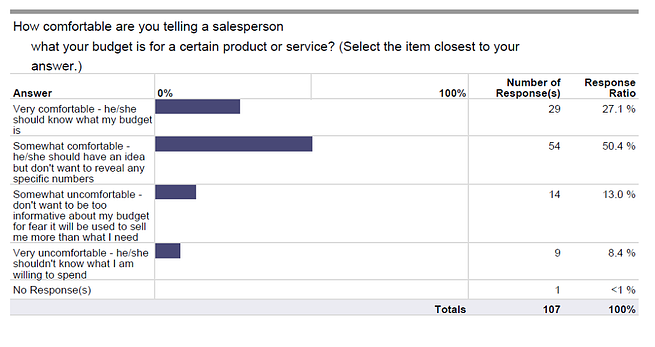Nearly every time you read about the top traits of successful salespeople you’ll find a section about qualifying buyers. In sales, the buyer is not the only one who should be making a decision. The salesperson has to decide how much time and energy to pursue the buyer. Too much time invested in an unqualified buyer prevents the salesperson from working with the right buyers to achieve his goals.
This article describes a very sound method for qualifying buyers – the BARTS method - 5 criteria to help you decide if a sales opportunity is worth pursuing.
Does the buyer have the Budget?
It is often challenging to ascertain the buyer’s budget. However, our research suggests that buyers are generally comfortable revealing information about their budget. When we asked decision makers how comfortable they are revealing information about their budgets, nearly 80% indicated they were very or somewhat comfortable. See chart below.
If a buyer fails to give you any indication of his budget, a follow up question like this might help…
“Based on what we've discussed, the investment for the right solution could be in the $5,000 to $10,000 range. How does that fit within your budget?”
This question will often reveal some information about the budget. The buyer might say, “That’s way out of my league” or “that sounds about what I was thinking”. At that point you’ll have much better idea about whether your buyer meets the “budget” criteria.
Does the buyer have the Authority?
A top sales performer needs to determine who has the authority to make the deal – who has the authority to “sign the check”. If you are investing your time with someone other than the decision maker, you run the risk of becoming an inanimate object in the eyes of the decision maker. After all, unless you get direct exposure and interaction with the decision maker during the sales process, how can you develop a relationship, understand his emotional needs, and get into alignment with what he wants to accomplish? It is impossible.
If you cannot get direct exposure and interaction with the decision maker, the salesperson should walk away. Not doing so, sets the salesperson up for investing a lot of time and energy, and not have much to show for it in the end.
Is the Revenue you’ll generate from the deal worth your time?
A good salesperson assesses the revenue potential of any given buyer early in the sales process and has to make a decision about whether it is worth pursuit.
Say your average sale is $5,000 over the first 12 months of a project. Based on conversations you are having about the needs of your buyer, you determine that first year revenue won’t likely be more than $2,000. If you feel the “customer lifetime value” (CLV) is $20,000 over the first 4 years, you might determine this to be a qualified buyer. On the contrary, if it appears your initial project will be a one-time event with little to no future revenue potential, you might determine that this deal doesn't deserve the time and energy you’d have to put into it to close the sale. You might be better off pursuing another qualified buyer.
What is the buyer’s Timeframe for making a decision?
How frustrating would it be for you to invest hours into a sale only to find out the buyer won’t be making a decision for 6 months? That’s what can happen if you fail to establish timing early in the sales process.
This is not to say you should ignore the buyer and move on to a better qualified prospect. If the sales opportunity meets all the other BARTS criteria, it should go into your lead nurturing process. Remember, only a small fraction of your target market is in the buying mode at any given time.
Due to the complexity of some products and services, the buying cycle might be months and years in the making. So, don’t give up on an otherwise qualified buyer. Nurture that buyer through the sales process so you can make your numbers today, and make your number tomorrow.
Does my Solution add value?
As I’ve stated many times, never sell something to a buyer that doesn’t truly add value and/or solve a problem the buyer is having. If you are selling security systems but the buyer’s greatest need is improving quality of his manufacturing process, this may not be a qualified buyer. Sure, this buyer may use a security system, but you are doing him an injustice if you try to sell him a product/service that doesn’t truly address his objectives.
Determine early on if the products and services you offer are what the buyer needs to solve his problem or capitalize on his business opportunity. If it’s a good match, go for it. If not, better to maintain your reputation as a trusted advisor in the marketplace and refer a trusted vendor who sells what the buyer needs, than to sell something that doesn’t really add value.
In the end, if you have a sales opportunity that 1) has an appropriate budget, 2) the buyer has the authority to make the buying decision, 3) the revenue you’ll generate is worth your time and energy, 4) a decision will be made in a timely way, and 5) the solution you are offering adds value, what more could you want? Invest the time and energy with your buyer.






Agree, disagree, or just have something to add?
Leave a comment below.